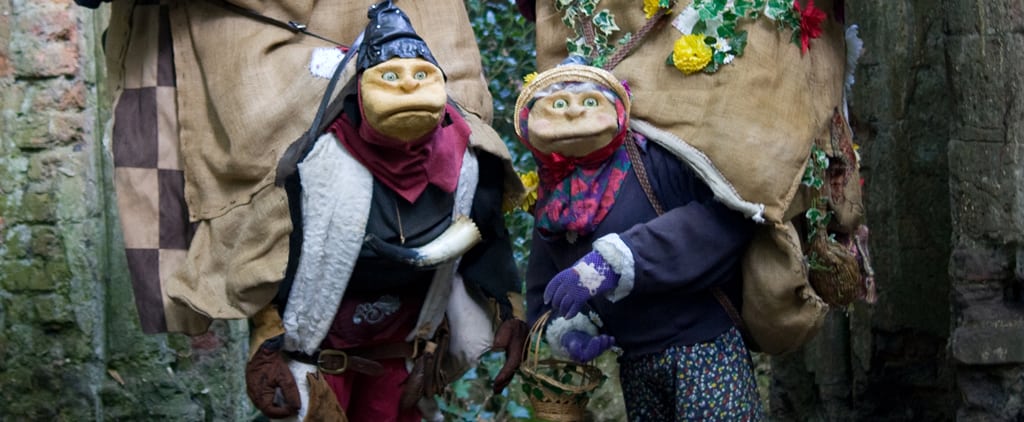[dropcap style=”fontsize:100px;color:#992211;”]S[/dropcap]ince 2001, spectacle makers, special effects artists and puppeteers The Flying Buttresses have plied crowds with gentle charm and wicked wit. Founders Danielle Brooke and Rupert Parry have brought their characters Hodman and Sally to events across the globe, proving that their characters’ bewildered wonder is universally engaging.
What’s the big idea behind your company? What do you aim to do?
Our aim is to marry film-quality aesthetics with funny, approachable, relatable characters to bring a bit of joy to the everyday life of others.
Do humans have a primal social need for theatre?
I think we have a primal need to see life mirrored and reflected back to us in some way, whether it be through theatre or another artistic medium. We have a need to understand our own emotions and relationships with others, and theatre is a perfect vehicle for trying to work out some of the complexities within that.
Is creating a suspension of disbelief more difficult without a fourth—or any—wall?
I don’t think so, but it does depend on what you are asking people to believe. We are physically tangible characters talking to real people about their lives within the same real space and time, so the suspension of disbelief relies on our ability to perform other-worldly characters believably and authentically, in a way that makes an audience member forget that we are anything but real. If we are doing our job well then the joy and captivation of the experience overwhelms the disbelief and audiences let go of any resistance. It’s a very freeing and enjoyable moment for people when that happens, I think, and definitely something that comes more easily for some than others.
How do local authorities help or hinder what you do?
We were lucky enough to start our company at a time when UK councils had much bigger arts funding budgets and we would often be invited to perform at excellent and diverse events organised by local authorities. Many of these regular events and festivals no longer exist due to lack of funding, which is a real shame and a loss for the communities that hosted them. I think most local authorities do still recognise the benefit of bringing theatre to the streets, to people who might not otherwise experience it.
Saying that, some events have survived and thrived, and there are still some fantastic outdoor arts festivals in Britain that seem to grow each year in popularity. There are also still some areas where councils work together with local business to successfully fund arts festivals and it’s always great to be a part of those.
How do you hold the attention of an audience who can easily wander off?
Keep them engaged and involved! We’ll work to capture an audience’s imagination quickly and start to build a reality together with them. That way they are as invested in it as we are and the positive feedback loop is amazing. We are visually striking and an uncanny illusion, which grabs immediate attention for us and then we work quickly to establish that the visual is just the beginning of the experience, asking questions, making jokes and establishing a warm rapport to cement the characters as real and authentic.
Good puppeteering is also key to weaving this spell… a few missed eye lines and you can lose someone very quickly. Trust with an audience is also important; we would never embarrass anyone or put them ont he spot without them encouraging it — it’s just not our style. We also often find that once an audience member has had their few minutes’ talking with Hodman and Sally they stay close to witness the reaction of others as they see us for the first time, sometimes following us for the rest of the show and even for our later sets! That’s really nice for us.
Are you driven mad by audiences fiddling with their phones?
The fiddling is okay; we have banter for that and can use it to our advantage! What can be bothersome is the barrier that people filming us for a long time creates. We enjoy the fluid transition between audience members being spectators and participants, and we like to draw people out from one to the other. But sometimes a person will set up camp as a viewer, filming the interaction we are having with another audience member. It gives the interacting participant a role and a self-consciousness that does not necessarily enhance the experience, as they can’t just let themselves enjoy it without being distracted by how they might come across on camera.
What makes you keep doing it?
It’s incredible to meet people from and visit places all over the world—over 100 countries to date. It’s amazing to think of all the thousands of people Hodman and Sally have crossed paths with and all the faces that they might have brought a smile to over the last 13 years.
A full version of this interview was published in Trebuchet 3: Art and Resistance, available here

Naila Scargill is the publisher and editor of horror journal Exquisite Terror. Holding a broad editorial background, she has worked with an eclectic variety of content, ranging from film and the counterculture, to political news and finance.




















